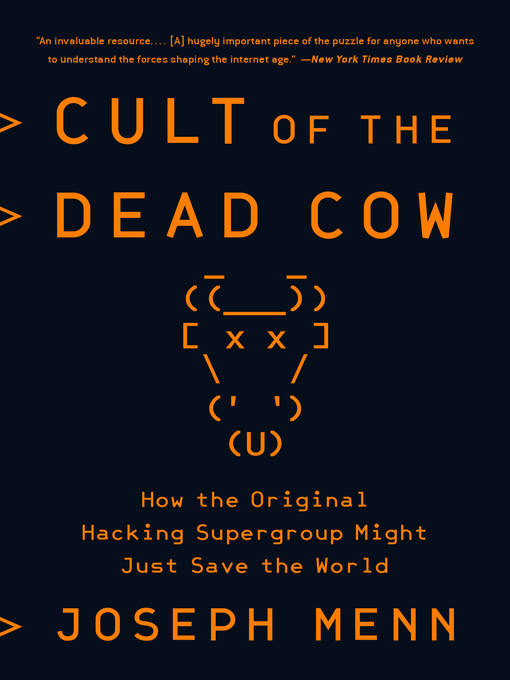
Cult of the Dead Cow
How the Original Hacking Supergroup Might Just Save the World
کتاب های مرتبط
- اطلاعات
- نقد و بررسی
- دیدگاه کاربران
نقد و بررسی

February 11, 2019
In a well-told if sometimes overreaching history, technology journalist Menn (Fatal System Error) chronicles one of the longest-established hacking groups, Cult of the Dead Cow, presenting it as a valuable antithesis to the military-internet complex. Also known as cDc, the collective has long been at the forefront of “hacktivism” as well as government cybersecurity efforts, with members lending their technological gifts to both the creation of anti-government surveillance software and the Defense Department’s DARPA agency. Menn offers authoritative insights into the organization’s inner workings, drawing on emails from and interviews with cDc members. He also spins an engaging tale about the group’s origins, among several disaffected teenagers in Lubbock, Tex., in the mid-1980s, but occasionally gets bogged down in side-stories, such as in an entertaining but unilluminating digression about one hacker’s family connections to the late ’60s San Francisco counterculture. Menn’s book covers almost too much ground for a relatively compact text. He elicits intriguing reflections from the hackers on various topical issues, such as the coopting of the internet by repressive governments, but only skims the surface of cDc’s many endeavors. Despite these drawbacks, Menn’s work does serve as a spirited examination of the art of hacking and how it might be used for good.

May 1, 2019
Computer pranksters and the internet come of age together, as the former become the leading security experts on the latter, joining forces with and against corporations and governments alike. "In its earliest days, the chief moral issues for the teens in the [hacking collective] Cult of the Dead Cow were how badly to abuse long-distance calling cards and how offensive their online posts should be," writes Reuters technology reporter Menn (Fatal System Error: The Hunt for the New Crime Lords Who Are Bringing Down the Internet, 2010, etc.). "But as they matured, the hackers quickly became critical thinkers in an era when that skill was in short supply....They all helped push a realistic understanding of security challenges and ethical considerations into mainstream conversations in Silicon Valley and Washington." The author narrates a fast-paced story about how a little-known movement that could trace its roots to the psychedelic rock of the 1960s--one visionary was the son of the Jefferson Airplane's drummer while another was a lyricist for the Grateful Dead--would eventually serve as security advisory for the Pentagon, the cybernetics industry, and geopolitical forces around the globe. Menn introduces many characters who were formerly anonymous or deeply underground, known only by their "cDc" monikers, the names by which they posted during the days before the World Wide Web, when bulletin boards attracted kindred spirits. The group had its genesis in the remote outpost of Lubbock, Texas, but its influence eventually extended from San Francisco to Boston and beyond, as computer technology triumphed over geographical logistics. They recognized the porousness of the web's security because they had penetrated it, and they knew that those insisting that information was secure were in denial. They knew that "everything was unsafe and would only get less safe as the economy grew more dependent on technology. This was classic market failure, compounded by political failure." A quick tale of black hats and white hats, with a lot of gray area in between.
COPYRIGHT(2019) Kirkus Reviews, ALL RIGHTS RESERVED.

























دیدگاه کاربران